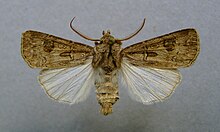You can help expand this article with text translated from the corresponding article in German. (October 2022) Click [show] for important translation instructions.
|
Agrotis bigramma, the great dart, is a moth of the family Noctuidae. The species was first described by Eugenius Johann Christoph Esper in 1790. It is found along the Baltic Sea's southern shore to China, the Levant and North Africa. Migrants have been reported as far west as Great Britain with three in one trap at St Agnes, Isles of Scilly on 10 August 1997.[1]
| Great dart | |
|---|---|

| |
| Scientific classification | |
| Domain: | Eukaryota |
| Kingdom: | Animalia |
| Phylum: | Arthropoda |
| Class: | Insecta |
| Order: | Lepidoptera |
| Superfamily: | Noctuoidea |
| Family: | Noctuidae |
| Genus: | Agrotis |
| Species: | A. bigramma
|
| Binomial name | |
| Agrotis bigramma (Esper, 1790)
| |
| Synonyms | |
| |

The wingspan is 40–48 mm. Adults are on wing from September to December. There is one generation per year.
The larvae feed on the roots of Poaceae species and other low growing herbaceous plants.
References
edit- ^ Kimber, Ian. "Great Dart Agrotis bigramma". UKMoths. Retrieved 15 December 2018.
External links
edit- Media related to Agrotis bigramma at Wikimedia Commons
- Great Dart at UKMoths
- Lepiforum e.V.